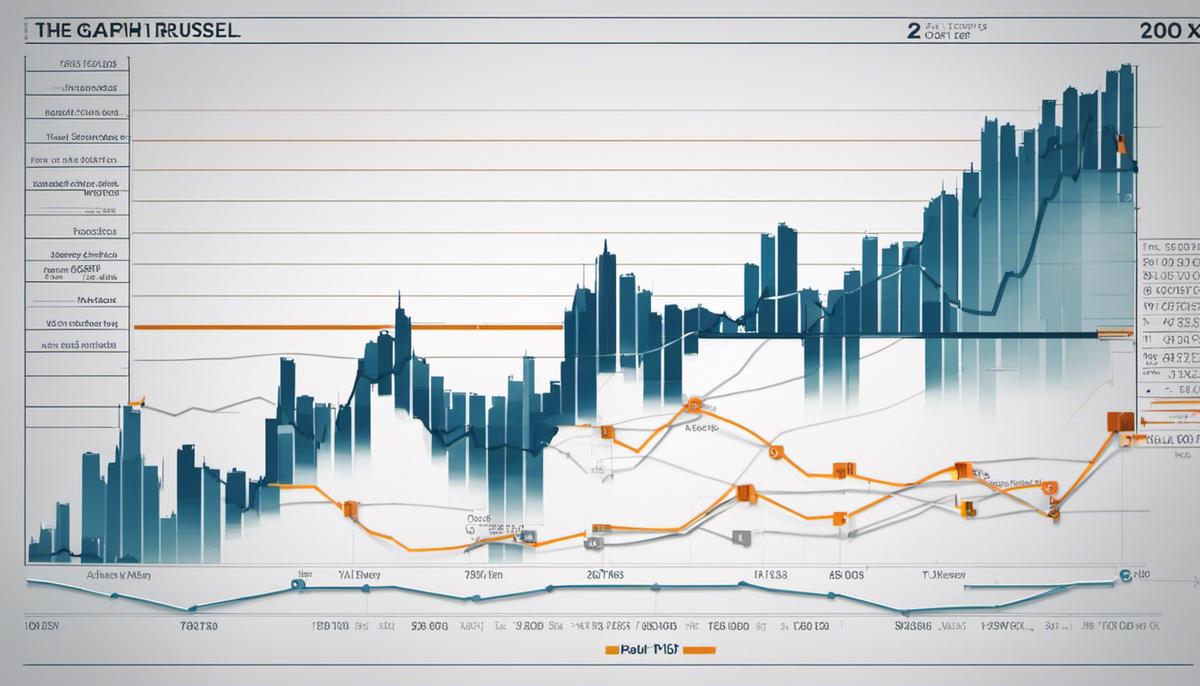Understanding stock market indices such as the Russel 2000 Index is important for both investors and the general public, this index offers a insight to the performance of certain sections of the U.S. stock market, providing financial decision making. However, on this article, we shall consider some the benefits, Impact of fintechzoom on Russel 2000 index
Russell 2000 Live
The Basics of Russel 2000 Index
Russell 2000 Index Definition
The Russell 2000 Index, a subset of the larger Russell 3000 Index, represents the 2,000 smallest publicly traded companies within the Russell 3000. It is a market-capitalization-weighted index, meaning that the weight of each company within the index is proportionate to its market cap (the total share value of a publicly traded company). It is often considered a reliable benchmark for the performance of small-cap stocks, those with a market capitalization of between $300 million and $2 billion. The Russell 2000, launched by the Frank Russell Company in 1984, is recalculated each year during the Russell Reconstitution.
Russell 2000 Index Role in the Stock Market
In the stock market, the Russell 2000 Index serves as a critical gauge for small-cap company performance in the United States. As such, it provides investors and analysts a comprehensive and reliable barometer for this section of the market. Because small-cap stocks are generally more volatile than their larger counterparts, the Russell 2000 can also be a leading indicator of shifts in market sentiment and economy.
Functioning of the Russell 2000 Index
The Russell 2000 operates as a subset of the broader Russell 3000 Index. The latter comprises approximately 98% of the US equity market, listed from largest to smallest by market cap. After the largest 1,000 companies for the Russell 1000 Index have been determined, the subsequent 2,000 companies make up the Russell 2000. Through this method, the Russell 2000 acts as an all-encompassing representation of small-cap stocks.
Calculation Method of the Russell 2000 Index
Each company within the Russell 2000 Index is weighted according to its market cap. The index itself is calculated using a “float-adjusted, market capitalization-weighted methodology.” This means that the share price of each company is multiplied by the number of shares available to the public (also referred to as the ‘float’). This value is then totalled for all 2,000 companies and divided by a specific divisor to create the index value.
Eligible Companies for Inclusion in the Russell 2000 Index
To be considered for inclusion in the Russell 2000 Index, companies must be part of the broader U.S equity market, and thus part of the Russell 3000 Index. These companies must also be open to public investment, be incorporated in the United States, and have a market capitalization that falls within the range of the 1,001st to the 3,000th largest U.S. company. Lastly, it is important to remember that the Russell 2000 index can hire or remove companies during its annual review process, known as the Russell Reconstitution, which takes place each June.
Top Russell 2000 Companies
The top Russell 2000 companies are those that have shown exceptional performance and have achieved significant growth in their respective industries. These companies may have experienced strong revenue growth, improved profitability, or gained market share. They often represent a diverse range of industries and sectors, including technology, healthcare, consumer discretionary, and industrials
Investors often pay close attention to the top Russell 2000 companies as they tend to be at the forefront of innovation and can provide valuable opportunities for investment. However, it is important to note that the rankings of these companies can change over time based on their financial performance and market conditions.
Some of the top Russell 2000 companies in recent years are
included innovative technology companies like
Penn National Gaming Inc
Activision Blizzard
Alphabet
Amazon
Apple
Microsoft
Roku Inc
Oracle
Tesla
Visa
Inogen Inc
e.l.f. Beauty Inc.,
Benefits Of investing Russel 2000 Index
The Russell 2000 is a widely recognized benchmark for small-cap stocks that includes the bottom 2,000 stocks in the Russell 3000 index. This index is often used as a measure of the overall health and performance of small to medium-sized companies in the U.S. stock market. However, investing in the Russell 2000 index can provide investors with numerous benefits,such as
Higher Returns.
Historically, small-cap stocks have outperformed large-cap stocks over the long term. This can be attributed to the fact that smaller companies have more room for growth and are often undervalued by the market. By investing in the Russell 2000, investors have the opportunity to capitalize on the growth potential of these smaller companies and potentially earn higher returns compared to investing in larger, more established companies.
Diversification.
The index comprises a broad range of sectors and industries, spreading investment risk across multiple companies. This diversification can help reduce the impact of any individual company’s poor performance on the overall portfolio. It also provides investors with exposure to a wide range of market sectors, allowing for potential upside from various economic conditions and trends.
Enhanced Liquidity
The index includes many smaller companies that may not be as widely followed by analysts and investors as larger companies. As a result, there may be opportunities for investors to find undervalued or overlooked stocks within the index. This can provide greater liquidity and trading opportunities for investors, allowing them to buy and sell positions more easily compared to investing in individual small-cap stocks.
Long-Term Financial Objectives.
By including small-cap stocks in a diversified portfolio, investors can potentially enhance portfolio performance and reduce volatility. This can help investors accumulate wealth over time and work towards achieving their financial goals, such as retirement or funding a child’s education.
Introduction to Fintechzoom and Russell 2000 Index
Fintechzoom is a prominent financial news and information portal, bringing you the latest updates, reports, and comprehensive analysis on financial markets including the performance of vital indexes like the Russell 2000. Covering the swing of the market trends from the smallest cap companies to the largest, Fintechzoom provides valuable insights that enable investors to navigate the constant ups and downs of the Russell 2000 Index. Furthermore, Fintechzoom accesses insights from seasoned finance experts and market analysts, promoting informed decision-making with their perspectives on the potential future direction of the index
Impact of FintechZoom on the Russel 2000 Index
FintechZoom monitors different financial indexes like the Russel 2000 Index. The Russel 2000 Index is a performance benchmark for small-cap companies in the United States. FintechZoom provides frequent updates on the performance of this index which helps investors to glean important insights about the small-cap segment of the market. Moreover, by comparing the performance of the Russel 2000 Index against other indexes, FintechZoom provides investors with a perspective on the direction of the broader market.
Conclusion
Overall, the substantive interplay between the Russel 2000 Index and FintechZoom provides a unique lens to view and understand the contemporary financial market. The influence and impact of FintechZoom’s analysis and reporting on market performance, particularly the Russel 2000 Index, demonstrate the critical role digital platforms have taken in shaping financial trends. As we keep abreast of the constant shifts and developments in the financial landscape, the comprehension of the intricate relationship between financial indices and financial technology sites such as FintechZoom becomes increasingly pertinent. This understanding not only boosts our financial literacy but also shapes our strategies and decisions in the financial sphere.
.









